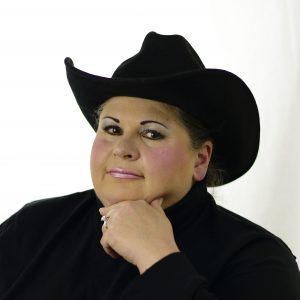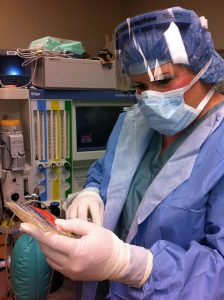Anita Lesko is the founder of the Global Autism Consulting Organization which aims to offer health care providers around the globe the knowledge and skills necessary to provide the best health care possible to their autistic patients. She and her husband Abraham assist small and large businesses in understanding their autistic employees and enabling them to incorporate people on the spectrum into their work team. Anita has an MS in Nurse Anesthesia and has been working as a Certified Registered Nurse Anesthetist for 26 years. She didn’t receive a diagnosis until the age of 50, but since then has become an internationally recognized autism advocate. She answered questions for us about her mission to help autistic patients and workers in the health care industry as well as her all-autistic wedding.
Describe your current professional focus and how you came to arrive at this position.
My current professional focus is to educate health care professionals about autism and enable them to provide optimal care for autistic patients. I want to promote the health and wellbeing of autistic individuals around the world.
I was diagnosed with autism at age 50. I’m now 56. I’ve been working the past 26 years as a Certified Registered Nurse Anesthetist. From my own personal experience as a health care professional, I realized that most health care providers know little about autism. How can you provide excellent care to a patient population you don’t understand? That’s where my autism and medical experience have joined forces to provide the knowledge and real life experience to other health care professionals.
What sparked a desire to become a military aviation photojournalist and did you face any obstacles to achieving this position?
In 1995 I rented TOP GUN and watched it for the first time. By the end of the movie, my Special Interest took over and I decided my dream was to get a flight in a fighter jet!! At that point in my life, I knew nothing about photography or writing. I started subscribing to numerous military aviation magazines. I studied how the articles were written and the types of photography they published. I spent massive amounts of time researching military aircraft and everything involving it. I eventually realized I knew more about all the jets than the pilots flying them! I bought a great camera and through sheer determination taught myself how to photograph jets flying in excess of 400 mph.
Next I had to be very resourceful and persistent to establish myself with the different military aviation magazines. My perseverance landed my articles and photos in all the very publications I admired so much.
After 7 years of doing all this, (and still working full time as an anesthetist), I got my dream flight in an F-15 fighter jet at Eglin AFB. A month after that I got a flight in a Navy training helicopter.
For a civilian to get a flight in an F-15 is nearly impossible. But I proved that hard work and persistence will enable you to achieve even the most far- reaching goal.
What are some of the most important issues medical patients on the spectrum face when they enter a hospital?
One is to be understood by the medical staff and being able to successfully manage the environment. A hospital is typically brightly lit, staff hurriedly moving about, pagers going off, phones ringing, overhead announcements, smells of disinfectants, numerous people, and getting touched by total strangers. It’s a very unwelcoming environment for most people, let alone an autistic individual.
What advice do you have for parents trying to advocate for their autistic children during a hospital stay?
For parents of autistic children my advice is to let the staff know ahead of time that their child is on the spectrum. Let them know specific triggers the child may have. Bring the child’s favorite toy or blanket. Anything that will give them comfort. From this point, it’s now up to the medical staff to do all they can to optimize that child’s experience.
What are some of the obstacles companies face when trying to welcome autistic employees into their workplace?
The obstacles companies have when welcoming autistic employees are numerous.
First, they need to provide things in writing, such as an Employee Handbook. Often when an autistic person is stressed, such as when starting a new job, they won’t process things they hear. They need to see it in black and white. This would include everything, like about clicking in, lunch time, communication with other employees, calling out sick, being late, and job expectations. It all needs to be in printed format.
Never assume the autistic employee will be able to “read between the lines,” or understand non- verbal communication. And autistic individuals do not generally understand idiomatic expressions. All the very things commonplace in the work environment are far from common to the autistic employee.
Despite how negative all that sounds, once the person understands what is expected of them, they will become a loyal, hardworking employee who can focus and probably work harder and longer than most of the other employees!
In what ways did your all-autistic wedding accommodate for guests and participants on the spectrum?
At our All-Autistic wedding, the biggest thing was that everyone was accepted for who they are!
You’ve mentioned that since your marriage both you and your husband have overcome your adversity to change? In what ways? Why do you think this is so?
During our courtship, For very unusual circumstances, Abraham and I had to meet in extreme secrecy. Due to that, we had to become extremely flexible in order to have the opportunities to be together. Our desperate burning desire to see each other enabled us to become spontaneous. So literally it happened because we wanted it to! This proves that autistic people CAN learn to deal with change and become spontaneous!
Changing behavior of an autistic individual can happen with repeated experiences and the willingness to change. They must WANT to change in order for it to happen.
Do you have any advice for parents who are trying to help their autistic teenagers or adult children navigate the world of dating?
Advice for parents of autistic children or adults concerning dating would be this: you need to start getting your child out into the world just interacting with people to learn how to communicate and socialize. Spend less time taking your kid to therapists, psychologist, etc., and instead get them into real- life situations. Like when they are a teenager, get them working at a fast- food restaurant, cutting lawns, being a volunteer at a hospital, etc. Only interacting with people over and over will enable them to be successful in life at a job or relationship. I am proof of that.
You can read more about Anita Lesko and her mission here:
http://www.globalautismconsultingorganization.org/
http://www.cdc.gov/ncbddd/autism/features/living-with-autism-spectrum-disorder-anita.html


